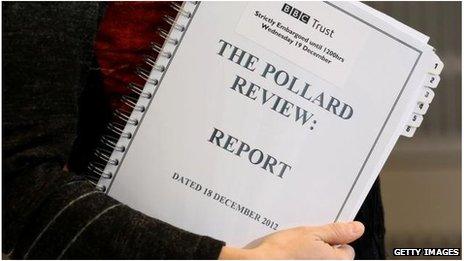Savile inquiry: Media reaction to BBC transcripts
- Published

Some 3% of the evidence that went into the Pollard Review has been redacted
Thousands of pages of evidence gathered during the Pollard Review into why Newsnight dropped its investigation into sexual abuse by Jimmy Savile have been published by the BBC.
In December, the independent review concluded that the decision to shelve the investigation had been "seriously flawed".
About 3,000 pages of emails, interviews and submissions from BBC executives and journalists have now been published online.
However, the BBC says it has blacked out about 3% of details for legal reasons.
The following is a selection of what some of the media thought about the release of the documents.
UK media
The conclusions of Nick Pollard's initial inquiry into the BBC's handling of the Jimmy Savile scandal were damning enough. This was, he said, a body where "leadership and organisation seemed to be in short supply", whose upper echelons "proved completely incapable of dealing" with the consequences of the decision to axe an investigation into the presenter's activities.
Yet reading the evidence published by his team yesterday provided a deeper, and even more worrying, understanding of the extent to which the BBC is not a broadcaster, but an unwieldy collection of feuding baronies, in which managers are most concerned not with serving the public, but with preserving their own status and reputation.
Leader article in The Daily Telegraph, external
In the transcripts, [Lord] Patten emerges as someone prepared to dump all over senior BBC managers, including the two former director generals, Mark Thompson and George Entwistle, the man he had described just four months previously as having "the ability to give leadership to a great creative organisation".
In talking of the weak executive team around his choice of director general, Patten said sarcastically that George Entwistle "talked a good game" about reducing the number of senior managers. Though he was "saying all the right things" about reforming management in the first 11 days of his 54-day reign, Patten said things began to unravel once the Savile scandal erupted.
Roy Greenslade in The Guardian, external
The most damaging charge against the Corporation is that we, the public, are not being allowed to see 90 pages of testimony given to the Pollard Inquiry by many of the BBC's own journalists and executives.
Line upon line of evidence was redacted upon its publication yesterday, on the spurious grounds it could be libellous. Sentences which began with phrases such as 'It is no secret that...' were, farcically, struck through with black pen.
Some 17 pages of Mr Paxman's testimony were partially blacked out. So much for the solemn promise made by BBC Trust chairman Lord Patten, at the beginning of the internal inquiry, to be 'open and transparent'.
Leader article in the Daily Mail, external
The Corporation's star inquisitor Jeremy Paxman, as usual, gets straight to the point.
With the same gusto with which he puts poorly-briefed Ministers to the sword, he described it as a "balls-up". Paxo added that it was "common gossip" at the BBC that Savile liked young girls.
Smug BBC Chairman Lord Patten blamed the "horrible screw-up" on Chinese-style management practices.
Devastating stuff - and that was just the evidence the Beeb's lawyers would let you see. Their black marker pen censored three per cent of the report for "legal reasons".
Leader article in The Sun, external
[Jeremy Paxman] told the inquiry it was "common gossip" at the BBC that Savile liked young girls before he was outed as a paedophile.
This is in stark contrast to other senior executives at the BBC, including former director general Mark Thompson and director of news Helen Boaden, who both told the inquiry they had never heard any "rumours" about the DJ.
Thompson told the inquiry: "I had never heard any rumours at all, if you like of a dark side of any kind, sexual or otherwise about Jimmy Savile."
Ms Boaden said she "had never heard any dark rumours about Jimmy Savile" but did meet him at a lunch for veteran radio presenters.
Editorial in the Daily Mirror, external
The decision to publish more than 1,000 pages of documents supporting Nick Pollard's report can be regarded as brave, or foolhardy, or simply - as we would see it - the duty of a publicly funded organisation. But it is a pity that fear of libel suits - or was it a last sliver of face-saving? - forced the redaction of the pithier remarks from Jeremy Paxman and others.
In the event, for all the nastiness, buck-passing and back-biting this mass of material exposes, it only reinforces Mr Pollard's conclusions: that the BBC's lines of accountability were deeply flawed and that members of its lavishly paid and top-heavy management saw it as their priority, in a crisis, to flunk responsibility rather than take it.
Twitter reaction
Sad truth is Entwistle would have been a good DG. Got that Beeb needed to be reformed. Landed in hot seat just as ship hit iceberg
Iain Martin, political journalist , external
Notable that #Savile transcripts are *scanned* PDFs - any journo knows makes it harder to analyse
Following Pollard disclosures:BBC say they are only interviewing BBC Boss themselves:We get a BBC interview with him or Nowt: Stalin? Mao?
- Published22 February 2013
- Published22 February 2013
- Published22 February 2013